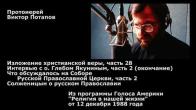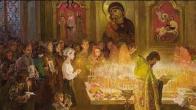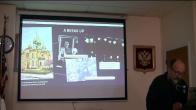You are here
LORD, IT IS GOOD FOR US TO BE HERE
The Divine Liturgy As An Experience of Transfiguration Open to Us
“Lord, it is good for us to be here” - these words were uttered by Apostle Peter, when he, having been brought by Christ, along with his brethren, Apostles James and John, up on Mount Tabor, saw the Lord transfigured: “...and His face did shine as the sun, and His raiment was white as the light. And, behold, there appeared unto them Moses and Elias talking with Him” (Мatt. 17:1-2).
Hearing the Gospel narrative about this wondrous event (Мatt. 17:1-9, Мk. 9:2-9, and Lk. 9:28-36), we may have doubts inside ourselves: “What bearing does this have on me and my life”? According to the teaching of the Church, the most direct one. One may even say that the Transfiguration of the Lord once again reminds us about the goal, the meaning, and the focus of our daily spiritual life as Orthodox Christians.
Several days before this event, the Lord promises to His disciples that “there be some standing here, which shall not taste of death, till they see the Kingdom of God” (Lk. 9:27). The Kingdom of God! – this is what was revealed to the Apostles on Mount Tabor that day. The Apostles saw a different reality. Yes, the Kingdom of God is not in the future, it is already here, it exists in parallel with our life that is full of running around tending to our earthly cares and, at times, serving various idols. The Kingdom of God was revealed to the disciples of Christ when they still were imperfect Christians – just like most of us. Apostle Peter had yet to disown His Teacher thrice, and all of the Apostles had yet to disbelieve the news of the appearances of the Risen Lord. And still they were able to behold the Kingdom of God – when they labored by ascending the mountain to lift themselves above our vain world and immersed themselves, as usual, in prayer, expecting nothing extraordinary to happen.
The Kingdom of God cannot be seen by physical eyes – only spiritual ones. When the Apostles beheld the transfigured Lord, it was also clear to them that next to Him were Moses and Elias – even though they could not know before that what those two great prophets of the Old Testament looked like in reality. In general, the state in which the Apostles found themselves during those moments, is not easy to describe. Apostle Peter was ready to stay there – at the top of an uninhabited mountain – forever. He experienced such joy that, according to the words of the Evangelist Luke, he “did not know what he was saying” (Lk. 9:33). The words of another great Apostle, Saint Paul, come to mind here – the Apostle who was also found worthy of beholding the Kingdom of Heaven when “he was caught up into paradise, and heard unspeakable words, which it is not lawful for a man to utter” (2 Cor. 12:4): “Eye hath not seen, nor ear heard, neither have entered into the heart of man, the things which God hath prepared for them that love Him” (1 Cor. 2:9). May this be an answer to those who, looking for an excuse to live far away from God, convince themselves that paradise is a “boring” place, compared to the “interesting” life in the unpredictable, controversial, passion-driven reality of the world around us.
So where can we experience the Kingdom of Heaven in our life – like the Apostles then on Mount Tabor? In Christ’s Church. God the Father, Who from a cloud called Christ during His Transfiguration “My Beloved Son”, commanded the Apostles and us with them: “listen to Him” (Мatt. 17:5). This would likely have not been said, had the people not been inclined to argue with Christ and try to replace the Divine truth with human “common sense” – in the same way as Apostle Peter attempted to talk Christ out of going to Jerusalem for His suffering and death. Don’t we, too, often have a tendency to “know better than Christ” how we should live and what we need in life? No, “listen to Him”, God says to us.
So in what way should we “listen to Him” Who came down from the heavens with a mission to “build His Church” (Мatt. 16:18), “loved the Church, and gave Himself for It” (Eph. 5:25)? Only by living a full-fledged church life, only by acquiring salvation in Christ’s Church. Can we, strictly speaking, say that we “listen to Christ” if we more like “go to church” from time to time rather than truly live in the Church? If we feel no particular interest in the Divine services? If we pray only when we are in the mood? If we “do not notice” fasts? And, most importantly, if we do not unite ourselves to Christ in the Sacrament of Communion instituted by Christ Himself after the Last Supper, in which Christians partake of His Body and Blood – even though Christ said “...Except ye eat the flesh of the Son of man, and drink His blood, ye have no life in you. Whoso eateth My Flesh, and drinketh My Blood, hath eternal life; and I will raise him up at the last day” (John 6:53-54)? To the early Christians it would be truly difficult to comprehend the habitual “presence” at the Divine Liturgy without participating in the Sacrament of Eucharist that is widespread these days. And in those times a Christian who had been absent from the Eucharistic gatherings without a valid excuse for three Sundays in a row was simply considered having excommunicated himself from the Church (Canon 80 of the 6th Ecumenical Council). Did the Eucharist since then cease to be the crux of our salvation, of our life in Christ? “Jesus Christ the same yesterday, and today, and forever” (Heb. 13:8), says the Holy Scripture.
The whole Divine Liturgy is, in a spiritual sense, the bringing of us by God up into His Heavenly Kingdom. Ascending – first literally, the steps of the entrance to our church, and then, represented by our clergy, onto the ambo, and, finally, after the Small Entrance, to the High Place in the altar (often made slightly higher than the rest of the altar), we, Christ’s Church, are led by Him onto that very mountain of Transfiguration. One well-known modern theologian wrote about the perception of this essence of the Divine Liturgy by the early Christians: “…For there – in heaven – they were immersed in the new life of the Kingdom; and when, after this “liturgy of ascension”, they returned into the world, their faces reflected the light, the “joy and peace” of that Kingdom… And when they were asked, “Whence shines this light, where is the source of this power?” they knew what to answer…”.
In His Transfiguration, Christ let the Apostles experience His Kingdom “as each one could endure”, “as much as they could bear”, as the Church sings on that day. The Lord grants each of us, too, through our regular participation in the Divine Liturgy, according to our spiritual maturity, faith, and efforts, the transfiguring experience of His Kingdom: He “shines upon us the light of His understanding”, “enlightens our essence”, “burns our sins with immaterial fire”, “sets us on the path of His commandments” (from the hymns of the Feast of Transfiguration) – so that we, too, can exclaim, “Lord, it is good for us to be here”.
Priest Victor Klimenko, August 2012
PARISH LIFE
RECENT VIDEOS
Address of our Cathedral
Subscribe to our mailing list
While all the materials on this site are copyrighted, you may use them freely as long as you treat them
with respect and provide attribution on the Russian Orthodox Cathedral of St.John the Baptist of Washington DC.









